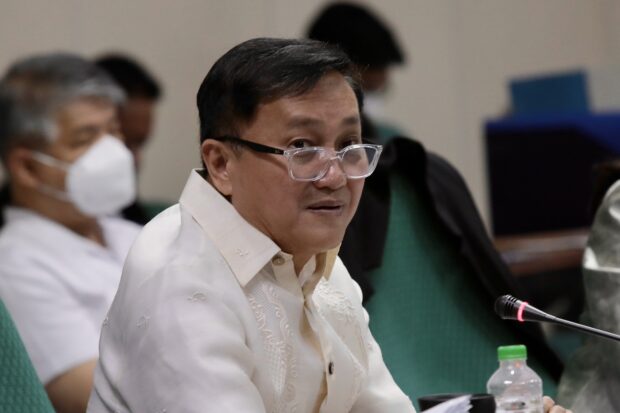DFA mishandling Afghan refugee issue – senator

Sen. Francis “Tol” Tolentino (File photo from the Senate Public Relations and Information Bureau)
MANILA, Philippines — Sen. Francis Tolentino on Saturday blamed the Department of Foreign Affairs (DFA) for mishandling the Afghan refugee issue and putting into question the country’s traditionally-compassionate refugee policy.
“I don’t see any intent (by DFA officials) to hide it, except maybe for a lapse in their procedures,” Tolentino said in a radio interview a day after a Senate hearing on the plan to temporarily host up to 50,000 Afghans fleeing injustice and oppression in their country.
“I am supportive of this, not because this was a request by the [United States], but for humanitarian considerations,” said Tolentino, chair of the Senate committee on justice and human rights.
“I do not see anything wrong with it, except maybe with how this was done haphazardly, and the lack of disclosure that should have been done by DFA,” he said.
Sen. Imee Marcos, chair of the foreign relations committee that held the hearing, bewailed the supposed lack of transparency in the plan.
Senate inquiry sought
“We need to know the real nature of the agreement between the Philippines and the United States and the course of action the executive branch plans to take,” she said in her resolution that called for the inquiry.
Because of the DFA’s opacity, Tolentino said some politicians have begun to take advantage of the issue to their perceived advantage, even painting the refugees as suicide bombers or US spies.
“We should not paint them in that kind of an image,” Tolentino said, noting that the Afghan refugees are victims of a government that even disallows young girls from going to school, among other abuses.
Moreover, Press Secretary Cheloy Velicaria-Garafil said President Marcos was well aware of the different aspects of the matter and its implications.
“The request is under evaluation. All concerns will be taken into consideration,” Garafil said in a Viber message to the Inquirer.
The Senate probe appeared to be a reaction to the first time the government accepted an undetermined number of Afghan refugees in 2021.
At that time, then foreign secretary Teodoro Locsin, now ambassador to the United Kingdom, refused to publicly discuss the matter, saying only that he wanted to see kindness when he looked in the mirror. It was not clear, however, whether Locsin took up the matter with legislators because the matter passed without a fuss.
Refugees of the past
There was also no kerfuffle when former President Rodrigo Duterte told the United Nations General Assembly in 2021 that despite its limited resources, the Philippines was ready to accept Rohingya people fleeing the military dictatorship in Myanmar.
During the administration of former President Gloria Macapagal-Arroyo, the government allowed a number of North Koreans, including former government officials, to transit through the Philippines en route to other countries.
In 2000, the administration of former President Joseph Estrada granted asylum to some 600 East Timorese during that country’s struggle for independence from Indonesia.
From the 1980s until the 1990s, the country also accepted up to 400,000 “boat people” fleeing regime changes in Laos, Cambodia and Vietnam through the refugee processing center in Morong, Bataan.
The country also granted asylum to hundreds of thousands of Chinese fleeing famine and their communist government from the 1940s up to the 1970s.
There were also thousands of “White” Russian refugees from 1949 to 1953 and hundreds of Jewish refugees in the 1930s.